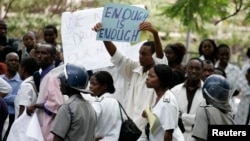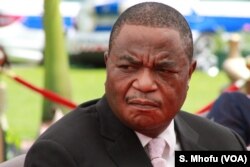The organization representing more than 15,000 striking nurses in Zimbabwe vowed a legal battle unless the government reverses its order to fire strikers from state-run hospitals.
"We are forced to approach the courts to intervene," Enoch Dongo, secretary general of the Zimbabwe Nurses Association, said Thursday.
Nurses went on strike Monday to demand better pay, better equipment for medical facilities and a bigger budget for the country's fragile health sector.
Zimbabwe Vice President Constantino Chiwenga announced late Tuesday that striking nurses would be fired immediately and would be replaced "in the interest of patients and of saving lives."
On Thursday, Dongo said the nurses had not received formal letters of dismissal. "At the moment," he added, "we are still employed, we are still government employees."
Dongo said he'd seen accounts that the government was recruiting retired nurses to replace the strikers.
Dr. David Parirenyatwa, Zimbabwe's health minister, told state broadcaster ZBC that nurses who have been dismissed must reapply for jobs if they want to return. "I must add that we do want our committed nurses to come to work," he said, adding that the country is experiencing a nursing shortage.
Dongo accused the government of unwillingness to negotiate, saying that stance has worsened health care conditions.
Cancer patient Edmore Siyakurima, who comes to the capital city for routine treatments, said the standoff presents a health risk to patients.
"Some like us get medication with three-week intervals. If we skip when we come to get injections, then the medication we take ceases to be useful," Siyakurima told VOA.
Siyakurima said the burden also falls on patients' relatives and friends, who share in what can be costly and inconvenient trips to and from the hospital.
Moline Chindove had been getting daily treatments for her swollen feet at Harare's Parirenyatwa public hospital, named for the official's father, a former health minister.
"My family has gathered funds for me to seek treatment in South Africa, because the hospitals here are closed," she told VOA.
Zimbabwe's President Emmerson Mnangagwa has said he intends to revive the economy, which shrank during the second half of former president Robert Mugabe's 30-year-rule. Mugabe was pushed out in November.
"Unreasonable wage demands, or worse, obdurate industrial action will hurt this recovery process," Mnangagwa's spokesman, George Charamba, told the state-owned Herald newspaper, according to French news agency AFP.
The nurses' labor action follows a recent monthlong strike by Zimbabwe's junior medical doctors. On Wednesday, the Zimbabwe Association of Doctors for Human Rights, along with Zimbabwe Lawyers for Human Rights, issued a statement saying they were "appalled by the government's arbitrary decision to dismiss all striking workers."
The Zimbabwe Teachers Union, which has threatened to strike next month for better pay, also denounced the dismissals.
This story originated in VOA Africa Division's English-to-Africa Service. The Zimbabwe Service's Thomas Chiripasi also contributed from Harare.





